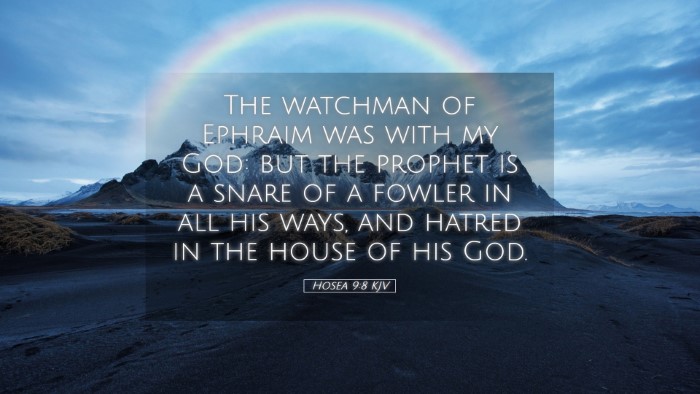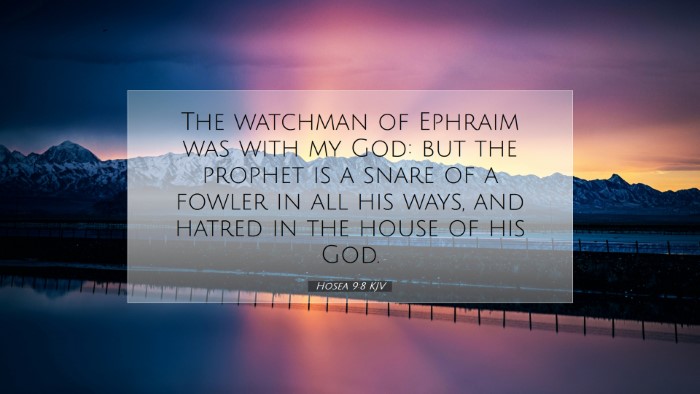Old Testament
Genesis Exodus Leviticus Numbers Deuteronomy Joshua Judges Ruth 1 Samuel 2 Samuel 1 Kings 2 Kings 1 Chronicles 2 Chronicles Ezra Nehemiah Esther Job Psalms Proverbs Ecclesiastes Song of Solomon Isaiah Jeremiah Lamentations Ezekiel Daniel Hosea Joel Amos Obadiah Jonah Micah Nahum Habakkuk Zephaniah Haggai Zechariah MalachiHosea 9:8
Hosea 9:8 KJV
The watchman of Ephraim was with my God: but the prophet is a snare of a fowler in all his ways, and hatred in the house of his God.
Hosea 9:8 Bible Commentary
Commentary on Hosea 9:8
Hosea 9:8 states:
"The watchman of Ephraim was with my God: but the prophet is a snare of a fowler in all his ways, and hatred in the house of his God."
Contextual Overview
In this verse, Hosea addresses the people of Israel, reflecting upon their prophetic leaders and the spiritual state of the nation. Ephraim symbolizes the northern kingdom of Israel, and the watchmen are the prophets who were supposed to guard the spiritual well-being of the people. The juxtaposition of these roles highlights significant themes in the book of Hosea, including idolatry, moral decay, and divine judgment.
Analysis of Key Phrases
-
The watchman of Ephraim
Matthew Henry notes that these "watchmen" were appointed to warn and guide the people but were often ineffective, leading the nation astray.
-
was with my God
This phrase implies a relationship between the prophet and God, indicating that true guidance comes from a divine source, yet the watchmen failed to communicate this truth effectively.
-
the prophet is a snare of a fowler
Albert Barnes explains this metaphor suggests that false prophets are traps that ensnare the people in sin and deception, diverting them from the true path laid out by God.
-
hatred in the house of his God
Adam Clarke comments that this hatred reflects the profound moral and spiritual corruption within Israel, where God's house—representing worship and community—has become a place of enmity rather than love.
The Role of Prophets
In examining the role of prophets in this context, we see a stark contrast between true and false prophecy. The prophets of Judah were expected to uphold God's commandments and lead the people toward righteousness, but their failure to do so resulted in significant consequences.
As Matthew Henry elaborates, genuine prophetic insight leads to awakening and repentance. However, the leaders mentioned in Hosea 9:8 engaged in practices that led to spiritual blindness rather than enlightenment.
Theological Implications
Hosea 9:8 carries profound theological implications regarding the nature of leadership and responsibility within faith communities. Trust in spiritual leaders is crucial, yet this trust can easily be misdirected when leaders deviate from their God-given mandates. Therefore, it is vital for believers to discern true prophetic voices from counterfeit ones, as emphasized in the writings of Albert Barnes.
This insight raises important questions for modern-day pastors and theologians: How can one evaluate the effectiveness and sincerity of spiritual leaders? What criteria should be employed to assess their fidelity to God's teachings?
The Condition of Israel
The reference to "the house of his God" underscores the spiritual desolation of Israel, indicating that worship had become ritualistic and devoid of genuine love for God. Clarke interprets the situation as a reflection of communal decline where animosity replaced devotion.
The context of this verse is essential for understanding the spiritual crisis faced by Israel as they engage in idolatry and forsake the covenantal relationship with God. The implications of these actions reveal a nation in moral decline, which serves as a warning for all peoples and nations across generations.
Conclusion
Hosea 9:8 presents a grave warning regarding the condition of Israel's spiritual leadership and the dire consequences of failing to adhere to God's commandments. The intertwining roles of watchmen and prophets remind us of the critical importance of both spiritual insight and moral integrity within a community of faith.
For pastors, students, and scholars, this verse serves as an exhortation to prioritize truth and righteousness in leadership, to cultivate a relationship with God that informs their ministry, and to remain vigilant against the snares of false teachings and deceptive practices.


